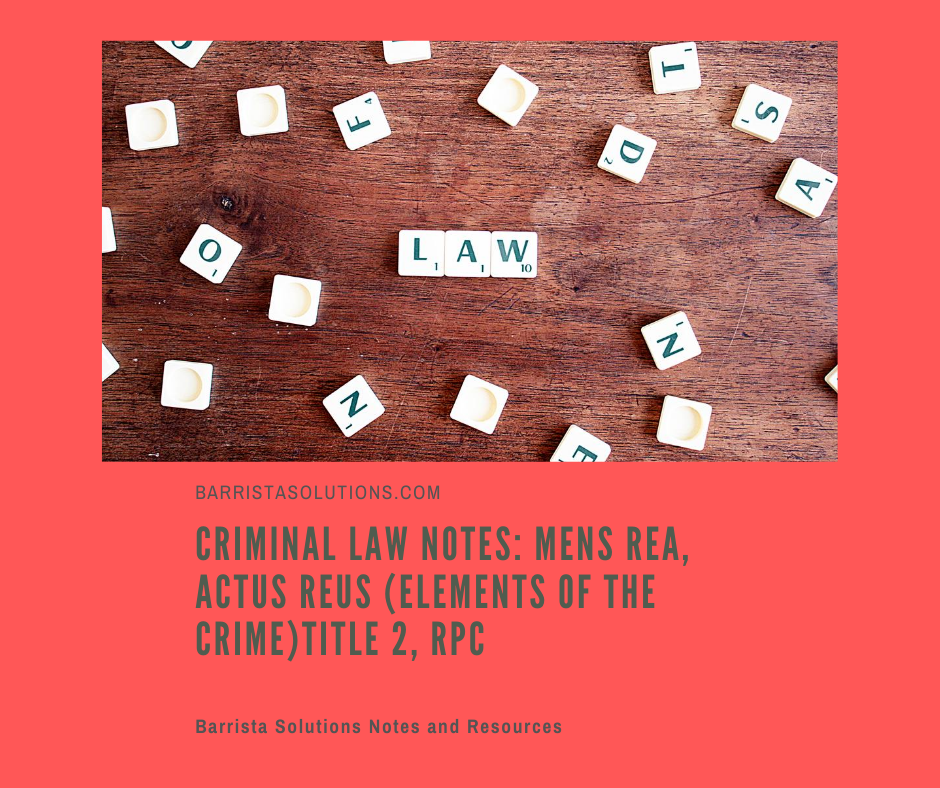Criminal Law Notes: Mens Rea, Actus Reus (Elements of the Crime) Part 2
- barristasolutions

- Aug 21, 2020
- 4 min read
Updated: Feb 18, 2021

TITLE II: CRIMES AGAINST THE FUNDAMENTAL LAW OF THE STATE
CHAPTER ONE: ARBITRARY DETENTION OR EXPULSION, VIOLATION OF DWELLING, PROHIBITION, INTERRUPTION, AND DISSOLUTION OF PEACEFUL MEETING AND CRIMES AGAINST RELIGIOUS WORSHIP
SECTION ONE: ARBITRARY DETENTION AND EXPULSION
ARTICLE 124. ARBITRARY DETENTION
1. That the offender is a public officer or employee;
2. That he detains a person;
3. That the detention is without legal ground.
Legal grounds for the detention of persons:
1. The commission of a crime; or
2. Violent insanity or other ailment requiring compulsory confinement of the patient in a hospital
Note on R.A. 6235:
Aggravating circ. to nos. 1 and2
1. When the offender has fired upon the pilot, member of the crew, or passenger of the aircraft;
2. When the offender has exploded or attempted to explode any bomb or explosive to destroy the aircraft;
3. Whenever the crime is accompanied by murder, homicide, serious physical injuries or rape;
ARTICLE 125. DELAY IN THE DELIVERY OF DETAINED PERSONS TO THE PROPER JUDICIAL AUTHORITIES
1. That the offender is a public officer or employee;
2. That he has detained a person for some legal ground
3. That he fails to deliver such person to the proper judicial authorities within:
12 hrs. for light penalties or their equivalent.
18 hrs. for correctional penalties or their equivalent.
36 hrs. for afflictive penalties or their equivalent
ARTICLE 126. DELAYING RELEASE
Three acts punished:
1. By delaying the performance of a judicial or executive order for the release of a prisoner;
2. By unduly delaying the service of the notice of such order to said prisoner;
3. By unduly delaying the proceedings upon any petition for the liberation of such person.
Elements:
1. That the offender is a public officer or employee;
2. That there is a judicial or executive order for the release of a prisoner or detention prisoner, or that there is a proceeding upon a petition for the liberation of such person;
3. That the offender without good reason delays either:
a. The service of the notice of such order to the prisoner;
b. The performance of such judicial or executive order for the release of the prisoner; or
c. The proceedings upon a petition for the release of such person.
ECTION TWO: VIOLATION OF DOMICILE
ARTICLE 127. EXPULSION
Two acts punished:
1. By expelling a person from the Philippines;
2. By compelling a person to change his residence.
Elements:
1. That the offender is a public officer or employee;
2. That he expels any person from the Philippines, or compels a person to change his residence;
3. That the offender is not authorized to do so by law.
Exception: (no expulsion) in cases of ejectment, expropriation or when the penalty of destierro is imposed.
ARTICLE 128 VIOLATION OF DOMICILE
Acts Punished
1. By entering any dwelling against the will of the owner thereof;
2. By searching papers or other effects found therein without the previous consent of such owner;
3. By refusing to leave the premises, after having surreptitiously entered said dwelling and after having been required to leave the same.
Common elements:
1. That the offender is public officer or employee;
2. That he is not authorized by judicial order to enter the dwelling and/ or to make a search for papers and for other effects.
Qualifying circumstances:
1. If committed at nighttime;
2. If any papers or effects, not constituting evidence of a crime are not returned immediately after a search is made by the offender.
ARTICLE 129. SEARCH WARRANTS MALICIOUSLY OBTAINED AND ABUSE IN THE SERVICE OF THOSE LEGALLY OBTAINED
Acts Punished:
1. Procuring a search warrant without just cause
Elements:
a. That the offender is a public officer or employee;
b. That he procures a search warrant;
c. That there is no just cause.
2. Exceeding his authority or by using unnecessary severity in executing a search warrant legally procured
Elements:
a. That the offender is a public officer or employee;
b. That he has legally procured a search warrant;
c. That he exceeds his authority or uses unnecessary severity in executing the same.
ARTICLE 130 SEARCHING DOMICILE WITHOUT WITNESSES
1. That the offender is a public officer or employee;
2. That he searches the domicile, papers or other belongings of any person;
3. That he is armed with a warrant;
4. That the owner or any member of his family or two witnesses residing in the same locality are not present.
SECTION THREE: PROHIBITION, INTERRUPTION, AND DISSOLUTION OF PEACEFUL MEETINGS
ARTICLE 131 PROHIBITION, INTERRUPTION, & DISSOLUTION OF PEACEFUL MEETINGS
Acts Punished:
1. Prohibiting, interrupting or dissolving without legal ground the holding of a peaceful meeting;
2. Hindering any person from joining any lawful association or from attending any of its meetings;
3. Prohibiting or hindering any person from addressing, either alone or together with others, any petition to the authorities for the correction of abuses or redress of grievances.
Common elements:
1. That the offender is a public officer;
2. That he performs any of the acts mentioned above
ARTICLE 132. INTERRUP-TION OF RELIGIOUS WORSHIP
1. That the offender is a public officer or employee;
2. That religious ceremonies or manifestations of any religion are about to take place or are going on;
3. That the offender prevents or disturbs the same
- Qualified by violence or threats
TITLE THREE: CRIMES AGAINST PUBLIC ORDER
ARTICLE 133. OFFENDING RELIGIOUS FEELINGS
1. That the acts complained of were performed:
a. In a place devoted to religious worship (not necessary that there is a religious worship); or
b. During the celebration of any religious ceremony;
2. That the acts must be notoriously offensive to the feelings of the faithful.












Comments